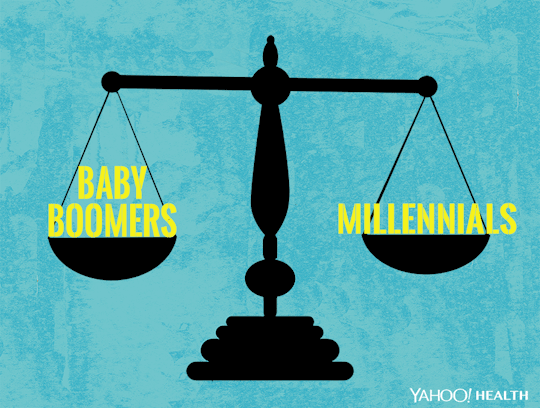They may have walked five miles — uphill, in the snow — to school, but Baby Boomers had at least one thing easier than Millennials do: shedding pounds. (Gif: Getty/Priscilla De Castro for Yahoo)
Next time you hear your parents complain that you have it easy, mention this: Scientists have discovered that it’s harder for millennials to lose weight than it was for their parents at the same age.
The findings were part of a new study published in the journal Obesity Research & Clinical Practice. For the study, researchers analyzed dietary data from the National Health and Nutrition Survey, which was collected from 1971 to 2008 from more than 36,000 U.S. adults. They also analyzed physical activity data between 1988 and 2006.
What they discovered: People were about 10 percent heavier in 2008 than in 1971 and five percent heavier, despite eating the same amount of food and doing the same exercise.

According to science, Yolanda Foster had an easier time maintaining her figure when she was young than her daughter, Gigi Hadid. (Photo: Getty Images)
“These results are clearly in contrast with the common notion that weight management is simply about what you eat and how much you exercise,” study co-author Jennifer Kuk, PhD, an associate professor in the School of Kinesiology and Health Science at Canada’s York University, tells Yahoo Health.
Kuk isn’t sure exactly why that’s the case, but she has a few theories:
1) Your mom probably had you at an older age: There is evidence that children born to older mothers have more fat than children born to younger mothers, Kuk says, especially if the mother is overweight. Since the U.S. population is heavier than ever (as a whole) and women are waiting longer to have children, it may play a role.
2) We’re eating later: Rodent studies have shown that when you eat can impact your weight. Those that ate later in the evening (as a lot of us do) weighed more than rats that mainly ate earlier in the day, Kuk says, even though both groups ate the same number of calories.
Related: The Tableware That Makes You Eat More
3) We’re taking different medications: “Some medications lower your metabolic rate and are related with weight gain,” says Kuk. The effect of medications can vary by person, but anti-depressants and medications to control diabetes have been linked to weight gain.
4) Environmental pollutants: Many chemicals in our environment are now linked with weight gain that may have an impact on the way our bodies deal with calories, Kuk says. A paper published in 2012 in the journal Environmental Health Perspectives dubbed these “obesogens,” i.e. dietary, pharmaceutical, and industrial compounds that may alter your body’s metabolism and predispose some people to gain weight.
Study co-author Christopher Ardern, PhD, tells Yahoo Health that the findings highlight the fact that obesity is a complex disease. “It also reinforces the notion that people should not become discouraged if they are doing all of the right things — eating healthy and living an active lifestyle,” he says.
Is there anything we can do about it?
Bartolome Burguera, MD, PhD, an endocrinologist and director of the obesity programs at Cleveland Clinic tells Yahoo Health that it’s all about lifestyle changes. While we may be eating healthier than our parents, he points out that we’re also having more sugar than they did. We’re also getting less sleep and are stressed out more, all of which can lead to weight gain.
But we’re also moving less than previous generations. “Maybe you think that you’re as active as your parents, but during the day you’re less active,” he says. You may have gone to the gym for 45 minutes, for example, but also may use an elevator to get to your office, send emails to colleagues instead of getting up to talk to them, and spend much more time sitting in front of a computer than your parents did.
As a result, “you finish off the day with less calories burned,” Burguera says. Striving to eat less sugar, getting more sleep, working on stress management, and trying to move more during the day — and teaching those habits to our children — can help off-set the difference, he says.
Kuk acknowledges that it’s simply harder to maintain a healthy weight these days, and says it’s more important to focus on moving more and eating better vs. a number on a scale. “Try to live as healthily as you can at whatever weight you are,” she says.




